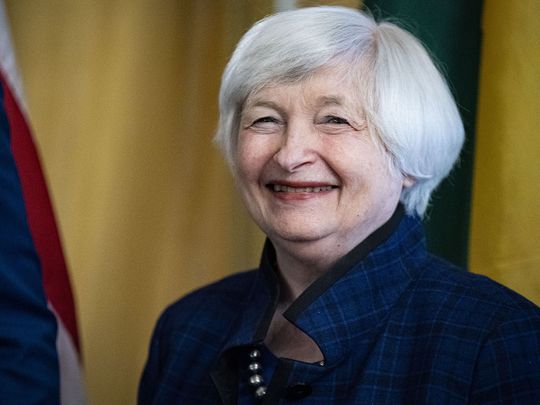
Washington: Janet Yellen, worried by the specter of inflation, initially urged Biden administration officials to scale back the $1.9 trillion American Rescue Plan by a third, according to an advance copy of a biography on the Treasury secretary.
"Privately, Yellen agreed with (former US Treasury Secretary Lawrence) Summers that too much government money was flowing into the economy too quickly," wrote Owen Ullmann, the book's author and a veteran Washington journalist. (The book is due out on September 27.)
Yellen disputed the claims in a statement issued on Saturday. "When President Biden assumed office, the nation was facing acute economic challenges. It was a time of great economic uncertainty, with legitimate risks of a downturn that could match the Great Depression," Yellen said. "I never urged adoption of a smaller American Rescue Plan package, and I believe that ARP played a central role in driving strong growth throughout 2021 and afterwards, with the US real GDP growth outpacing other advanced economies and our labor market recovering faster relative to historical experience."
Wavering influence on voters
Ullmann's account sheds new light on a policy debate that preceded the eruption of inflation, which now poses a major political threat to President Joe Biden and his Democratic party's control of Congress. Fears of overheating have since proved justified as price increases this year hit a 40-year high and severely damaged Biden's standing among voters.
Democrats have blamed the cost surge on supply-chain bottlenecks caused by the pandemic and on energy price surges following Russia-Ukraine war outbreak. They've also pointed a finger at moves by companies in some sectors to pad their profits. But most economists cite outsize demand - fueled in part by Biden's spending plan - as having been a significant factor.
Cut rescue package by a third
Yellen's concern about inflation "is why she had sought without success to scale back the $1.9 trillion relief plan by a third early in 2021 before Congress passed the enormous program," wrote Ullmann, who had "unfiltered access" to Yellen as he researched the book, according to publisher PublicAffairs.
Ullmann wrote, "She worried that so much money in the pockets of consumers and businesses would drive up prices at a time when the pandemic had caused severe shortages of goods that were in unprecedentedly high demand."

Selling the Plan
The ARP was passed in March 2021 after Congress had already approved two giant pandemic aid packages totaling almost $3 trillion, enacted during the previous Trump administration. It's unclear from the book how staunchly Yellen lobbied to cut back the size of the third wave of aid or whom she engaged with in the administration. And Ullmann goes on to emphasize that Yellen threw her full weight behind the bill as it moved ahead in its larger size.
The Treasury chief endorsed the package before US lawmakers, telling them that historically low interest costs on federal debt had given the government space for fiscal expansion. She has continued to defend the ARP even as high inflation proved persistent. In an April 28 speech, she said it had helped drive unemployment to 3.6 per cent, practically a 50-year low, and had prevented the pandemic from causing a much higher degree of suffering for Americans.
Still, Yellen "would have preferred something closer to $1.3 trillion, according to colleagues," Ullmann wrote. "But given the choice between Biden's full $1.9 trillion package and less than $1 trillion that some in Congress preferred, Yellen believed going big was the better course."
Yellen also felt that even if the bill pumped too much money into the economy, the subsequent spike in inflation would be "transitory," a term she used through 2021.
Unsighted by Ukraine war
In a June 1 television interview, Yellen said, "I was wrong about the path inflation would take." Though she added that much of the miss was due to unanticipated shocks, including the emergence of new COVID-19 variants and the war in Ukraine. "High inflation is now the Administration's top economic priority. We are committed to addressing it by respecting the independence of the Federal Reserve and giving them the space to act," Yellen said in the statement Saturday.
"We are also using policy tools we have to address supply side bottlenecks and urging Congress to act to lower some of the high costs facing Americans, in areas such as prescription drugs. We also support reducing the deficit to ease inflationary pressures."












